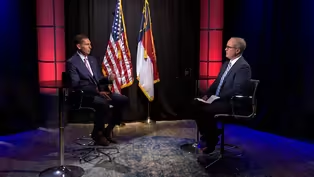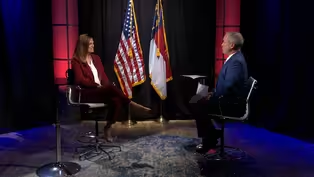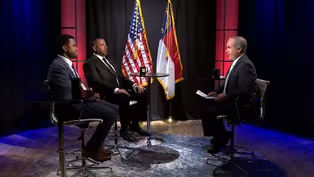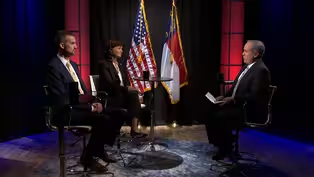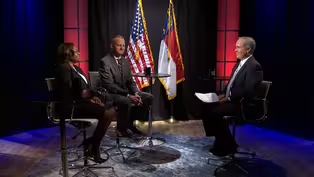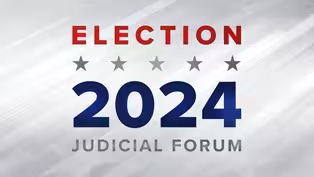
2024 NC Court of Appeals Seat 15 & Supreme Court Seat Candidates
Season 2024 Episode 2 | 26m 46sVideo has Closed Captions
St. 15: Chris Freeman (R) & Martin Moore (D). Supreme C.: Jefferson Griffin (R) & Allison Riggs (D).
Candidates for NC Court of Appeals seat 15 (Chris Freeman, Republican; Martin Moore, Democrat) and NC Supreme Court (Jefferson Griffin, Republican; Allison Riggs, Democrat) discuss their background and why they’re running with PBS NC’s Kelly McCullen. These interviews are a partnership with the NC Bar Association.
Problems playing video? | Closed Captioning Feedback
Problems playing video? | Closed Captioning Feedback
Election is a local public television program presented by PBS NC
The 2024 Judicial Candidates Forum is made possible by a partnership between PBS North Carolina and the North Carolina Bar Association.

2024 NC Court of Appeals Seat 15 & Supreme Court Seat Candidates
Season 2024 Episode 2 | 26m 46sVideo has Closed Captions
Candidates for NC Court of Appeals seat 15 (Chris Freeman, Republican; Martin Moore, Democrat) and NC Supreme Court (Jefferson Griffin, Republican; Allison Riggs, Democrat) discuss their background and why they’re running with PBS NC’s Kelly McCullen. These interviews are a partnership with the NC Bar Association.
Problems playing video? | Closed Captioning Feedback
How to Watch Election
Election is available to stream on pbs.org and the free PBS App, available on iPhone, Apple TV, Android TV, Android smartphones, Amazon Fire TV, Amazon Fire Tablet, Roku, Samsung Smart TV, and Vizio.
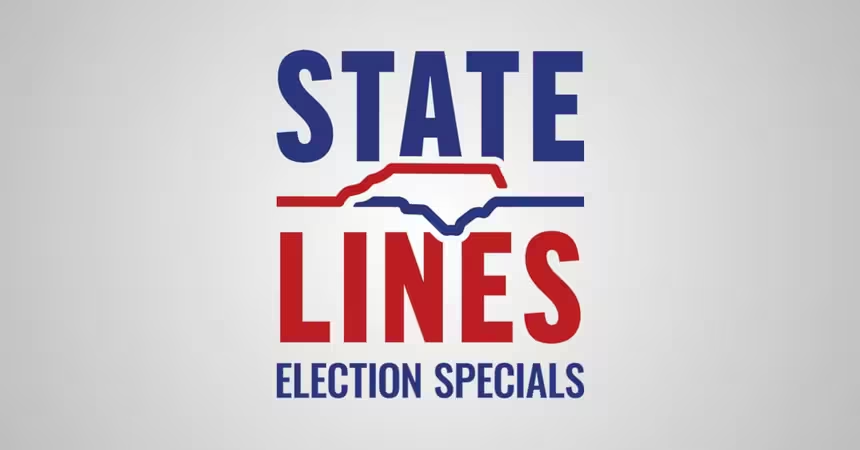
Council of State Candidate Interviews
During major election cycles, State Lines host Kelly McCullen sits down for in-depth conversations with candidates running for Governor and Council of State positions.Providing Support for PBS.org
Learn Moreabout PBS online sponsorshipMore from This Collection
2024 NC Judicial Forum
NC Supreme Court Candidate Jefferson Griffin (R)
Video has Closed Captions
NC Supreme Court candidate Jefferson Griffin (R) discusses the position. (6m 43s)
NC Supreme Court Candidate Allison Riggs (D)
Video has Closed Captions
NC Supreme Court candidate Allison Riggs (D) discusses the position. (6m 41s)
NC Court of Appeals Seat 15: Chris Freeman (R) & Martin Moore (D)
Video has Closed Captions
NC Court of Appeals seat 15 candidates Chris Freeman (R) & Martin Moore (D) discuss the position. (12m 59s)
NC Court of Appeals Seat 14: Ed Eldred (D) & Valerie Zachary (R)
Video has Closed Captions
NC Court of Appeals seat 14 candidates Ed Eldred (D) & Valerie Zachary (R) discuss the position. (12m 20s)
NC Court of Appeals Seat 12: Tom Murry (R) & Carolyn J. Thompson (D)
Video has Closed Captions
NC Court of Appeals seat 12 candidates Tom Murry (R) & Carolyn J. Thompson (D) discuss the position. (12m 56s)
2024 NC Court of Appeals Seats 12 & 14 Candidates
Video has Closed Captions
Seat 12: Thomas Murry (R) & Carolyn J. Thompson (D). Seat 14: Ed Eldred (D) & Valerie Zachary (R). (26m 46s)
Providing Support for PBS.org
Learn Moreabout PBS online sponsorship- The 2024 Judicial Candidates Forum is made possible by a partnership between PBS North Carolina and the North Carolina Bar Association.
[bright music] Hello again, thank you for joining us, because joining me here on the set, the nominees for North Carolina's Court of Appeals, seat number 15, Democratic candidate, Martin Moore and Republican candidate, Chris Freeman are here.
Gentlemen, thank you so much for your time and sharing your insights with not only me, but with our viewers out there across North Carolina.
- You're welcome.
- Thank you for having us.
- Now, we flipped a coin backstage to see who would start with an opening statement.
This is not a debate, but it will have an opening and closing remarks.
And by virtue of the coin flip, you have the first two-minute introductory speech directly to the voters or to myself, Mr. Moore.
- Thank you, Kelly, and thank you to the North Carolina Bar Association for hosting this forum.
My name's Martin Moore, and I'm running for seat 15 on the North Carolina Court of Appeals.
I'm running for this seat, because I believe that we need qualified, diverse voices serving on our bench if we wanna uphold our duty to assure equal justice for everyone under the law.
I began my career as a public defender, fighting for just outcomes for every person, regardless of how much money they had in their pocket.
In private practice, I moved on, working on complex civil matters and everywhere from state court cases to federal court cases, as well as cases before the North Carolina Supreme Court and North Carolina Court of Appeals.
And now I have my own law firm where I do appellate work and mediation work and currently serve as a Buncombe County commissioner.
Now, in this role, I've learned a lot about what's facing people in their everyday lives, but more and more, the answer comes back to the Court of Appeals.
When people talk to me about everyday issues, things that come up for us on Buncombe County Commission, for example, school funding and what our education system looks like, a lot of these questions are coming back to the Court of Appeals and the Supreme Court.
When we're talking about gerrymandering and when we're talking about reproductive rights and healthcare, all of these come back to the Court of Appeals, and I think that we need qualified voices who are willing to stand up to extremism, apply the Constitution and protect equal rights for every person in the state of North Carolina.
So I'm excited to be here with you all today and share with you a little bit about my vision of what it means to uphold the law, fight for equal justice for everyone, and make sure that we have a court that is committed to upholding the Constitution.
- Chris Freeman, your two minutes.
- All right, good afternoon, Kelly.
It's absolutely wonderful to be here.
I appreciate you, the North Carolina Bar Association, and PBS for doing this.
And you and these voters out here in North Carolina are probably looking at me like, "We recognize this guy."
There's a reason for that, sir.
I was in the movie "Talladega Nights" as an extra, so there's lots of people across state know who that is.
But more importantly, I was born here in North Carolina, raised here in North Carolina, grew up in a small town called Denton, North Carolina.
Went to Asheville High School, home of the Blue Comets, from there to High Point University.
Once I graduated, it was not quite the resort it is today, from there to Regent University where the motto is, "Christian leadership to change the world."
Now I was blessed to be in private practice for just a short amount of time, then went to work as an assistant DA in Rockingham County, and I spent eight years there trying cases before juries, before judges.
I worked with victims, I worked with law enforcement, and I worked with everyone in the court system.
I saw how the court worked.
Now in 2014, I decided to run for judge against an incumbent, and I was successful in that run for judge.
And when I was sworn in in 2015, I've been a district court judge ever since.
I've not been opposed.
I'm in my third term, ninth year.
And in that court, in that capacity, I've had the honor of serving in all the courts inside the court system, whether it's criminal or civil.
And 2013, at the age of 35, I joined the US Air Force and went in as a JAG Reserve officer.
I make rank to major next month.
In that capacity, I've served the citizens of the entire United States in a legal capacity.
When I go to base, I'm in a legal office, I do civil stuff, I write legal reviews, I do wills, part of court cases, and just a diverse experience that I've had the opportunity to do.
And I'm thankful for God for blessing my life and giving me the opportunity.
I've had much prayer for me, and it's an honor to be running for North Carolina Court of Appeals.
I feel like I have the experience needed.
And I am a judge, if you look back at my track record, who will stay in my lane.
I will not legislate from the bench.
I follow the law as it is, and I uphold and defend the Constitution.
And I've taken that oath no less than six times as an assistant DA, a judge, and an officer in the military.
- All right, Mr. Moore, if you had to name the most important qualification of any judge, set aside their political party, those qualifications that make a great Court of Appeals judge, what are they in your estimation?
- If I had to start, I'd say experience doing the work.
A big part of what's interesting about the Court of Appeals is that it's a very unique skillset.
You're not appearing in the trial level, have plenty of trial experience, but it's an error-correcting court.
But that requires experience, not just appearing in the courtrooms or hearing the trial court matters, but making sound, cogent arguments at the appellate level, understanding what's going to move those three-judge panels when they're making the decisions about what the Constitution looks like and having a broad overview of what it means to practice in any setting.
You're not just looking at criminal cases, you're not just looking at civil cases, it can be anything under the sun when you're on the Court of Appeals.
So having that experience serving as an appellate attorney before the North Carolina Court of Appeals and North Carolina Supreme Court is an extremely beneficial asset that I hope to bring to the bench, and knowing not just what it means to serve on that bench, but looking at it from the perspective of an appellate advocate and someone who has appeared in those courtrooms in that capacity before.
- Mr. Freeman, I'll ask you the same question 'cause there might be subtle differences.
We are in a partisan race after all, in this day and age.
Important qualifications as you look at that Court of Appeals, what skills need to be there, what sentiments?
- Yes sir, I agree with Mr. Moore here that as a sitting judge, the experience is what matters when you're going to the appellate level.
I've been a judge for almost 10 years.
At the end of this year, it will be 10 years.
I've made important, hard decisions from a judge's perspective for three terms.
And as a prosecutor, I made the same kind of decisions for eight years, so that's almost 18 years.
When I'm making decisions for command in the military, it's the same thing.
There's an expectation that you'll know the law, you'll follow the law, and you'll treat all those who come before you fairly and impartially with respect and dignity, inside and outside of the court.
I've gained the trust of the voters in Rockingham Castle County.
They voted me in three terms.
Prior to that, I was a prosecutor.
And I feel like that's because they know that they got somebody that knows the law, that'll go there and make these difficult decisions while basing it on the law and the Constitution, giving people confidence in the court system, that it's all based on the law, upholding the law, and following the Constitution, not legislating from the bench.
- Of all that experience you've got, what particular skills have you learned over the years?
And whether it's in the military or in civilian court, I guess is what you would call it, what would you pull out of that to go, "That's what I learned when I was considering running for Court of Appeals.
That's what I'll bring."
- Yes, sir.
Well, that's a good question, sir.
Listening to people, letting 'em have their day in court, treating them with fairness and respect, whether they come to you from a jail uniform, or they come in the fanciest suit, letting them know that no matter if they represent themselves pro se or they have the finest lawyer, that they're gonna be treated fairly with dignity, with respect, with fairness and impartiality, but more importantly, that the judge knows the law, follows the law as it is, no matter who comes before them.
- Mr. Moore, public defender, you've got private practice experience, Buncombe County Commissioner.
Dive into all those experiences.
Which few do you bring out as being exemplary, great examples of your leadership and why it best qualifies you for Court of Appeals.
- Absolutely, well, I think a common thread across all of those ends up being transparency and integrity, being willing to put on the line, because a lot of times you'll hear the same words come up in the court system, equality, equal justice, what does it mean to get the right outcome?
And I think that's gonna be where you see a lot of difference between judges, people who are willing to share what their values are and be able to state what fairness and justice looks like to them, what that dignity and respect looks like when we're having people from any background step into our court system.
As a public defender, that meant showing up and fighting for those who didn't have any money in their pocket.
But I also believe that justice has no zip code.
I think that we have to make sure that everybody's treated fairly and not just talk about that in an abstract sense, but be aware of what challenges people face, and understand how our system works at every level, both in civil courts, what the barriers are to equal justice and what the barriers are and making sure that everyday people feel respected in that courtroom.
And as a Buncombe County commissioner, I've seen firsthand the challenges that the everyday person faces when they get a Court of Appeals decision.
Most of us aren't reading these for fun on the weekends, so you're looking at folks who often don't understand why the system is the way that it is, but are being forced to navigate that.
So I think having that policy experience as a commissioner and also having that appellate experience of having been an attorney in those courtrooms has counted for a lot and will count for a lot on the bench.
- I wanna squeeze in one last question, about a 30-second answer needed here, about the independence of the judiciary.
People vote for parties, and they'll see a party affiliation beside each of you.
How important is it to be independent, or should voters look at party affiliation when determining a judge, even on the Court of Appeals, which is a very technical court?
- My question?
- Your question.
- All right, so I have a unique perspective on that.
When I ran for judge the first time in 2014, it was nonpartisan, so I worked very hard.
I had one county, not 100 counties as I do now.
But the first question, when you go out and you're working boots on the ground, talking to people and knocking on doors, they wanna know what your party affiliation is.
The voters deserve to be educated.
They need to know.
And that's not where they stop at.
They look at your background.
They look at what your knowledge of the law, they look at your experience.
But it's not up to us judges to make the rules for how elections work.
The rules are put in place by our constitution and other branches of government, but we, as judges, follow the law as it is.
And now, the way it is, it's partisan, but we're supposed to be fair, and I can tell you, it never comes into the courtroom.
I don't know what party somebody is when they're before me.
I never ask, don't wanna know.
They're all treated the same based on the law and the evidence.
- What should voters expect of you, Mr. Moore, running under a party affiliation, but yet judges are deemed independent in so many ways, if not all ways.
- I think the folks expect the judiciary to be independent and free from that bias or extremism or any kind of political decision making.
One of the biggest things that's important to me is that integrity and transparency again, of making sure that people know that when I'm making my decisions, it's not going to be based on party or serving as a rubber stamp for friends of the legislature, it's going to be about making the decisions about the case before me and having that track record of knowing I'm going to fight for the just outcomes, and I'm gonna assure just outcomes regardless of political party.
And I think that comes down to transparency and being clear about what's motivating you.
- All right, gentlemen, that concludes my questions.
We do have about a minute for each of you to give a concluding argument directly to the voters of North Carolina.
Tell 'em about your campaign, while you're seeking this office.
- I'm seeking this office, because I know it's going to take a qualified, diverse set of perspectives to have a functioning, high-quality Court of Appeals.
It's going to mean having a Court of Appeals full of judges who have that background of knowing what it means to advocate in those courtrooms and understand and appreciate there is no place for partisan politics or extremism in our court system.
With me, I'm sharing with people, I'm committed to equal justice under the law, and I want everyone to know that they're going to have a jurist who is willing to hear the facts of their case and is going to stand up for the rights of all people under the North Carolina Constitution and committed to a system that does not put partisanship over individual rights and constitutional law.
- That's Martin Moore, Democratic nominee for Court of Appeals, will be seat 15 on your ballot.
Mr. Freeman, the last minute is all yours by virtue of the coin flip, concluding argument, sir.
- Thank you, Kelly.
It's an honor to be in this position, to be your Republican candidate for North Carolina Court of Appeals.
I'll admire my colleague here.
Long ago, I started as a prosecutor.
I did that for eight years.
Then I was elected to a district court judge.
I've almost done that for almost 10 years.
Service in the military, almost 11 years.
I have a servant's heart.
I wanna serve my state.
I wanna serve my country, and I have done so.
And I think that's what the voters expect when you get to the high level of Court of Appeals.
You need the experience.
You need the knowledge.
You need to know what it's like to have those things.
I've been endorsed by the Fraternal Order of Police and the Police Benevolence Association.
Those folks have seen my track record, how I've been in the courtroom, not only as a prosecutor, but as a judge.
They don't know so much about my military, but I'm serving and I've told you I'm making the rank to major next month.
It's a big deal.
It takes a lot to do these courts.
There's only 15 judges.
We wanna make sure with panels of three, we get it right, and it's an honor to serve.
And I can't stop without thanking the voters in North Carolina.
I had to win a primary.
I had to win against the other Republican.
And with their help and with their votes, I won 90 of 100 counties, that's huge.
And I just hope that I can get their support moving forward.
And my website is ChrisFreemanforjudge.com, thank you.
- Thank you gentlemen, and thank you for watching.
In-person early voting begins October 17th, 2024, will end on November 2nd.
Election day is November 5th, 2024.
It's also the deadline for any absentee ballots to be received by your local elections offices.
All voters will be asked to present a photo ID.
[bright music] - Joining us now is Democratic candidate for North Carolina's Supreme Court, Allison Riggs.
Ms. Riggs, thank you so much for taking time outta your busy schedule.
- Thank you so much for having me.
- Well, it's election season, and your name is one of many on a large North Carolina ballot in 2024.
Tell us about yourself, your background, why do you want to remain on the Supreme Court?
- Yeah, I grew up in West Virginia, from humble backgrounds.
Put myself through school, undergrad masters in law, and settled in North Carolina like many people did for opportunity and because family settled here.
Been here now 16 years and love it.
I spent my career as a civil rights attorney with a heavy focus on appellate law.
So, I have argued in front of all of North Carolina's appellate courts many times, the fourth and fifth Circuit Courts of Appeal, the Federal Appeals Courts, and twice in the United States Supreme Court.
So I have built my career on defending the Constitution and know from experience that the character, integrity, and intellectual curiosity of the people wearing those black robes matters an awful lot, particularly when you're at the court of highest review.
And so, I want to continue my work in public service in a different way and continue to stand up for our Constitutional rights.
- How big is the difference between sitting on the bench and looking down and having them approach, versus you being the attorney who approaches the bench?
- Yeah, it's a different mindset, but I think those, the fact that I was so recently in the shoes of the attorneys appearing before us was really helpful.
Appellate courts are very different than trial courts.
I have a lot of respect for the attorneys who are working so hard to present cases on appeal, that you're not re-litigating the facts, you are arguing the law.
It's almost the purest legal exercise.
And I've been in front of judges who I thought were dismissive of the cases that we were bringing and judges who haven't, who weren't.
And so I wanna be a judge that every person who walks in front of my bench knows that I'm gonna give them a fair shake.
The attorneys know how deeply I respect them.
And ultimately, I think my track record over the last two years has proven that I'm doing what I intended to do.
- Lay people expect a Supreme Court justice to write opinions, you know, dissents, majority opinions, but what other job duties with being an associate justice on North Carolina's Supreme Court to you are very important once we look under the hood of this job to see what it's really all about?
- Mentorship is incredibly important.
We have a lot of interns and externs and clerks, first job outta law school who come through our chambers and we provide the on-the-job education that's gonna set up a lot of lawyers for success and create opportunities.
We have a lot of law schools in North Carolina, and I'm really proud.
A lot of people invested in me early in my career.
It wasn't an accident that I argued my first United States Supreme Court case eight years out of law school.
It's because I was blessed to have mentorship and people pouring into me.
And I take very seriously that I now have a position of power where I can turn around and hold out my hand to the young lawyers coming up behind me and create opportunities and chances for learning for them.
- Let's talk about dissent.
What factors do you consider in deciding whether you'll dissent?
Bearing in mind, that unlike the Court of Appeals, a dissent on the Supreme Court has no immediate effect.
- Yeah.
Well, actually the role of dissent on the Court of Appeals has changed recently too.
It used to trigger a right of appeal to the Supreme Court, but I've given this a lot of thought since I joined.
Obviously, we have partisan seats.
There are five Republicans and two Democrats.
And if, you know, my seat is, I'm a Democrat and one of the two Democrats, I want to build bridges.
That is my first and foremost goal to get to the right answer.
But if I can't help the court get to what I believe the right answer is, I know that dissents are a really important part of shaping how the law develops over time.
If you look back in the history of this country, there have been dissents that have shaped where the law went, important dissents in a case after, in World War II, Korematsu, where we were sending young Japanese Americans to internment camps on the West Coast and the US Supreme Court approved of that.
And the dissents that said, even national security doesn't justify us discriminating on the basis of race have shaped where the law went.
That's been true in voting cases, in criminal cases, in LGBTQ issues.
So, I am speaking for what I believe is right and also planting a seed that hopefully bears fruit in the future.
- I have about 45 seconds.
I want to ask.
Voters are being asked to vote for Supreme Court Justices on a partisan basis, Republican, Democrat.
How much should partisanship link to predictability if a person votes with their party, or even against their party, in choosing you or your opponent?
- Yeah, well, you know, partisan politics have no role in the court.
I hope that people, that through opportunities like this, they can get to know me, my heart, my character, my background, and my experience, and choose to vote for me based on that.
But the decision to make these elections partisan, obviously injects a level of politics that I wish weren't there.
But notwithstanding, what I'm gonna do is lead with character, intelligence, curiosity, and humility.
- Democrat Alison Riggs, candidate for Supreme Court, thank you so much for your time.
- Thank you for having me.
- And you can watch more judicial candidate interviews on our website, pbsnc.org/judicialforums or visit PBS North Carolina's YouTube page.
- And joining me is Republican candidate for North Carolina Supreme Court, Jefferson Griffin.
Mr. Griffin, good to have you back in the PBS North Carolina studio.
- Thank you, Kelly.
I haven't been back here, I was here in 2020, I guess, got back from a military deployment to the Middle East and Iraq and Jordan and Kuwait.
And so glad to be back with you.
- Well, thank you for your service.
Well, first of all, this state's a lot different than it was just four years ago.
Tell us who you are, why you're running, what do you stand for as you seek the Supreme Court seat?
- Well, thank you.
Yeah, my career has been about service here in North Carolina.
Most recently, I was elected to the North Carolina Court of Repeals in 2020 by the voters of this state in a statewide election where I've served since then, authored over 200, close to 250 opinions of that court, ranging, wide areas of the law, and, I feel, provided a great service there.
Prior to that, I was a district court judge.
I was a trial court judge in Wake County, elected by the people in Wake County.
I think that's a great perspective to add to the court.
Notably, there's no former trial court judges on the Supreme Court now with Justice Morgan's resignation.
So traveling the state, talking to trial court judges, going to their conferences, they want somebody on the bench who understands that we're not there to retry cases, relay the evidence, we're there to simply look at what's below and make sure there weren't any errors.
And I think that's an added perspective.
Prior to that, I was a prosecutor here in Wake County.
I worked for Colin Willoughby, who was the elected DA then, prosecuted cases from infractions to homicides, jury trials, bench trials, worked in the busiest courthouse in the state, in the busiest DA's office.
And so great experience there.
Prior to that, I was in private practice, did civil defense work, criminal defense work.
Also, I mentioned, I'm currently still in the Army National Guard here in North Carolina.
I've served on active duty while mobilized.
I'm currently the senior defense counsel for North Carolina, which is, you know, I help soldiers who are going through some issues with our military justice system or administratively.
I live in Carter County full time.
My courthouse is in Raleigh.
My wife is a lawyer and very good one.
And we are blessed with two children, Jay and Annie, who are about three and one, approximately.
- We know justices write opinions, and that's a big deal in a large part of the record.
But what other judicial duties do you find very important as you eye a seat on the Supreme Court, other than writing decisions?
- So, we're, as jurists, a couple of points I'd like to make, one, we're important for civic education.
I think as appellate jurists, we have a certain degree of flexibility and have a responsibility to go out and make sure the public understands the separation of the powers in our state, what our branch does.
And I think I have a great perspective to do that, having worked in our trial courts as a practicing attorney, as a trial court judge, as a prosecutor, working in the trial courts and with the appellate courts and have the military experience.
So I think that helps me make that point to our citizens.
I think that's a great value add for what we can do as jurists here in North Carolina.
- That had a broad resume of experiences throughout your career so far.
Of that experience, dive deeper, which experience in particular do you think uniquely prepares you for the North Carolina Supreme Court?
- Well, I have been blessed with a lot of great experiences in our profession here in North Carolina.
And I am very thankful for that.
You know, when it comes to how we work in the appellate courts, being able to express your judicial philosophy, being able to work with your colleagues.
I think that's something that I bring to the table here.
And we have value add to the North Carolina Supreme Court.
If you look at our dissent rates at our court, I mean, we sit in panels of three at the Court of Appeals where I serve now.
Our descent rate at our court is approximately 6%.
That means on panels, maybe 6% are divided on my panels.
I've only descended in 1% of the cases, which means I've been able to build coalitions.
I've been able to go to my colleagues and say, "Hey, this is the way I interpret the law."
And that's part of our job as jurists.
My military experience having been put in with divisions from Indiana or New York or folks that you don't even know and you're say, "Hey, here's a complex set of issues that you need to figure out and work together and achieve a goal."
And so I think that translates very well to our appellate courts.
- Of course, we're running partisan races now, so there will be an R beside your name, D beside your opponent's name.
But when voters go in the ballot or go look at their ballot to cast that vote, should they have expectations behind party affiliation for any candidate running for a court or judges meant to be, if not nonpartisan, at least not predictable.
- My oath is to the constitution and to the rule of law.
It's not to any political party or leader.
And that's how I have practiced law, that's how I have sat as a jurist, how I've decided cases.
That's how I serve as a soldier in the United States Army.
I put on a uniform with a flag on my shoulder in the Army.
I go in there with no policy agenda, just like I do in the courtroom.
I'm there to look at the facts and the law and apply them the same in every situation.
And so I don't think it matters what our party affiliation is on the ballot.
And I will say this, I think it is more ideological.
I think North Carolinians want a conservative jurist versus a liberal jurist.
And I think that there is a difference there.
I don't think it has anything to do with party affiliation, but people want jurists who interpret the laws as it's written and who aren't legislating from the bench.
And North Carolinians see that as a conservative jurist, and that's what North Carolinians want, and that's what they voted for consistently.
- This is Jefferson Griffin, Republican nominee for North Carolina Supreme Court.
Mr. Griffin, thanks for your time.
- Thank you, Kelly.
I appreciate the opportunity and I hope that North Carolinians will consider giving me their vote.
- Thank you for watching, folks.
For more information, visit pbsnc.org/vote.
I'm Kelly McCullen.
Thank you so much for watching.
[bright music] ♪ [bright music continues] ♪ The 2024 Judicial Candidates Forum is made possible by a partnership between PBS North Carolina and the North Carolina Bar Association Nation.
- [Announcer] Quality Public Television is made possible through the financial contributions of viewers like you, who invite you to join them in supporting PBS NC.

- News and Public Affairs

Top journalists deliver compelling original analysis of the hour's headlines.

- News and Public Affairs

FRONTLINE is investigative journalism that questions, explains and changes our world.
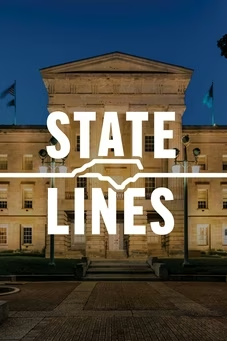











Support for PBS provided by:
Election is a local public television program presented by PBS NC
The 2024 Judicial Candidates Forum is made possible by a partnership between PBS North Carolina and the North Carolina Bar Association.
